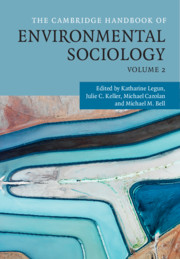Book contents
- The Cambridge Handbook of Environmental Sociology Volume 2
- The Cambridge Handbook of Environmental Sociology
- Copyright page
- Contents
- Figures
- Tables
- Contributors
- Foreword
- Introduction
- Part I Methods
- Part II Embodied Environmental Sociology
- Part III Beyond the Human
- 9 Interventions Offered by Actor-Network Theory, Assemblage Theory, and New Materialisms for Environmental Sociology
- 10 Plants and Philosophy, Plants or Philosophy
- 11 Animals and Society: An Island in Japan
- Part IV Sustainability and Climate Change
- Part V Resources
- Part VI Food and Agriculture
- Part VII Social Movements
- Index
10 - Plants and Philosophy, Plants or Philosophy
from Part III - Beyond the Human
Published online by Cambridge University Press: 05 November 2020
- The Cambridge Handbook of Environmental Sociology Volume 2
- The Cambridge Handbook of Environmental Sociology
- Copyright page
- Contents
- Figures
- Tables
- Contributors
- Foreword
- Introduction
- Part I Methods
- Part II Embodied Environmental Sociology
- Part III Beyond the Human
- 9 Interventions Offered by Actor-Network Theory, Assemblage Theory, and New Materialisms for Environmental Sociology
- 10 Plants and Philosophy, Plants or Philosophy
- 11 Animals and Society: An Island in Japan
- Part IV Sustainability and Climate Change
- Part V Resources
- Part VI Food and Agriculture
- Part VII Social Movements
- Index
Summary
In this chapter, I consider the double danger of objectifying plants and of treating them as subjects, modeled on the dominant, metaphysical model of subjectivity. I argue that the unconscious danger lurking in the shadows of granting subjectivity to plants, animals, and entire ecosystems is not just that global capitalism may cunningly coopt challenges to anthropocentrism but that the newfangled status of other-than-human lives may actually be the next logical step in the extension of immaterial, subjective, cognitively mediated commodities. The enlargement of the subjective sphere is conducive to the growth not of plants but of capital. Instead of these alternatives, I advocate a view of existence from the intermediary space-time of the inbetween.
- Type
- Chapter
- Information
- The Cambridge Handbook of Environmental Sociology , pp. 176 - 187Publisher: Cambridge University PressPrint publication year: 2020

